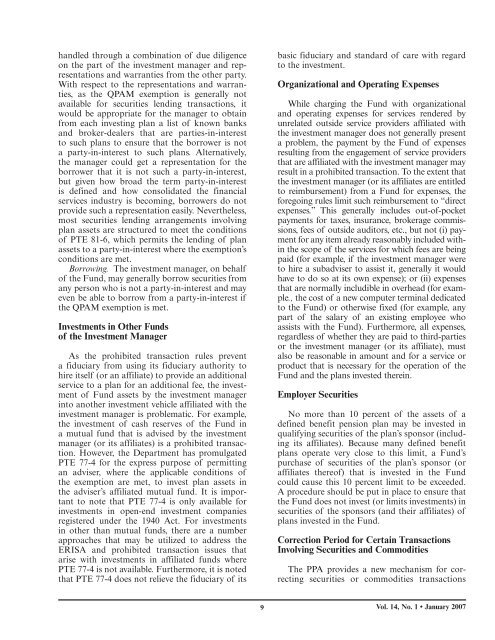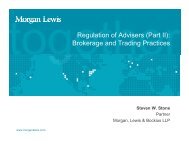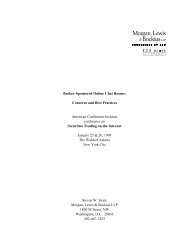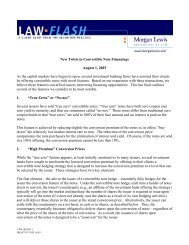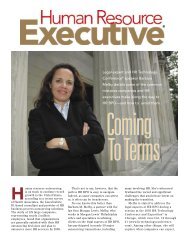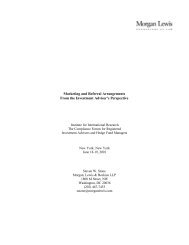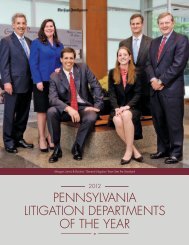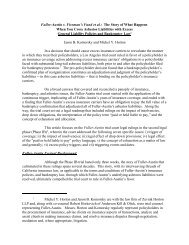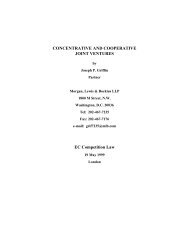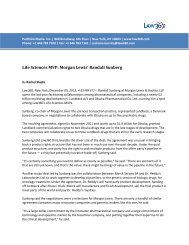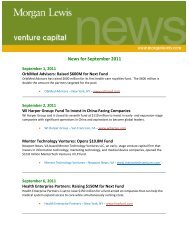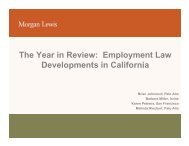What to Do if Your Fund Becomes Subject to ERISA - Morgan, Lewis ...
What to Do if Your Fund Becomes Subject to ERISA - Morgan, Lewis ...
What to Do if Your Fund Becomes Subject to ERISA - Morgan, Lewis ...
Create successful ePaper yourself
Turn your PDF publications into a flip-book with our unique Google optimized e-Paper software.
handled through a combination of due diligence<br />
on the part of the investment manager and representations<br />
and warranties from the other party.<br />
With respect <strong>to</strong> the representations and warranties,<br />
as the QPAM exemption is generally not<br />
available for securities lending transactions, it<br />
would be appropriate for the manager <strong>to</strong> obtain<br />
from each investing plan a list of known banks<br />
and broker-dealers that are parties-in-interest<br />
<strong>to</strong> such plans <strong>to</strong> ensure that the borrower is not<br />
a party-in-interest <strong>to</strong> such plans. Alternatively,<br />
the manager could get a representation for the<br />
borrower that it is not such a party-in-interest,<br />
but given how broad the term party-in-interest<br />
is defined and how consolidated the financial<br />
services industry is becoming, borrowers do not<br />
provide such a representation easily. Nevertheless,<br />
most securities lending arrangements involving<br />
plan assets are structured <strong>to</strong> meet the conditions<br />
of PTE 81-6, which permits the lending of plan<br />
assets <strong>to</strong> a party-in-interest where the exemption’s<br />
conditions are met.<br />
Borrowing. The investment manager, on behalf<br />
of the <strong>Fund</strong>, may generally borrow securities from<br />
any person who is not a party-in-interest and may<br />
even be able <strong>to</strong> borrow from a party-in-interest <strong>if</strong><br />
the QPAM exemption is met.<br />
Investments in Other <strong>Fund</strong>s<br />
of the Investment Manager<br />
As the prohibited transaction rules prevent<br />
a fiduciary from using its fiduciary authority <strong>to</strong><br />
hire itself (or an affiliate) <strong>to</strong> provide an additional<br />
service <strong>to</strong> a plan for an additional fee, the investment<br />
of <strong>Fund</strong> assets by the investment manager<br />
in<strong>to</strong> another investment vehicle affiliated with the<br />
investment manager is problematic. For example,<br />
the investment of cash reserves of the <strong>Fund</strong> in<br />
a mutual fund that is advised by the investment<br />
manager (or its affiliates) is a prohibited transaction.<br />
However, the Department has promulgated<br />
PTE 77-4 for the express purpose of permitting<br />
an adviser, where the applicable conditions of<br />
the exemption are met, <strong>to</strong> invest plan assets in<br />
the adviser’s affiliated mutual fund. It is important<br />
<strong>to</strong> note that PTE 77-4 is only available for<br />
investments in open-end investment companies<br />
registered under the 1940 Act. For investments<br />
in other than mutual funds, there are a number<br />
approaches that may be utilized <strong>to</strong> address the<br />
<strong>ERISA</strong> and prohibited transaction issues that<br />
arise with investments in affiliated funds where<br />
PTE 77-4 is not available. Furthermore, it is noted<br />
that PTE 77-4 does not relieve the fiduciary of its<br />
basic fiduciary and standard of care with regard<br />
<strong>to</strong> the investment.<br />
Organizational and Operating Expenses<br />
While charging the <strong>Fund</strong> with organizational<br />
and operating expenses for services rendered by<br />
unrelated outside service providers affiliated with<br />
the investment manager does not generally present<br />
a problem, the payment by the <strong>Fund</strong> of expenses<br />
resulting from the engagement of service providers<br />
that are affiliated with the investment manager may<br />
result in a prohibited transaction. To the extent that<br />
the investment manager (or its affiliates are entitled<br />
<strong>to</strong> reimbursement) from a <strong>Fund</strong> for expenses, the<br />
foregoing rules limit such reimbursement <strong>to</strong> “direct<br />
expenses.” This generally includes out-of-pocket<br />
payments for taxes, insurance, brokerage commissions,<br />
fees of outside audi<strong>to</strong>rs, etc., but not (i) payment<br />
for any item already reasonably included within<br />
the scope of the services for which fees are being<br />
paid (for example, <strong>if</strong> the investment manager were<br />
<strong>to</strong> hire a subadviser <strong>to</strong> assist it, generally it would<br />
have <strong>to</strong> do so at its own expense); or (ii) expenses<br />
that are normally includible in overhead (for example.,<br />
the cost of a new computer terminal dedicated<br />
<strong>to</strong> the <strong>Fund</strong>) or otherwise fixed (for example, any<br />
part of the salary of an existing employee who<br />
assists with the <strong>Fund</strong>). Furthermore, all expenses,<br />
regardless of whether they are paid <strong>to</strong> third-parties<br />
or the investment manager (or its affiliate), must<br />
also be reasonable in amount and for a service or<br />
product that is necessary for the operation of the<br />
<strong>Fund</strong> and the plans invested therein.<br />
Employer Securities<br />
No more than 10 percent of the assets of a<br />
defined benefit pension plan may be invested in<br />
qual<strong>if</strong>ying securities of the plan’s sponsor (including<br />
its affiliates). Because many defined benefit<br />
plans operate very close <strong>to</strong> this limit, a <strong>Fund</strong>’s<br />
purchase of securities of the plan’s sponsor (or<br />
affiliates thereof) that is invested in the <strong>Fund</strong><br />
could cause this 10 percent limit <strong>to</strong> be exceeded.<br />
A procedure should be put in place <strong>to</strong> ensure that<br />
the <strong>Fund</strong> does not invest (or limits investments) in<br />
securities of the sponsors (and their affiliates) of<br />
plans invested in the <strong>Fund</strong>.<br />
Correction Period for Certain Transactions<br />
Involving Securities and Commodities<br />
The PPA provides a new mechanism for correcting<br />
securities or commodities transactions<br />
Vol. 14, No. 1 • January 2007


